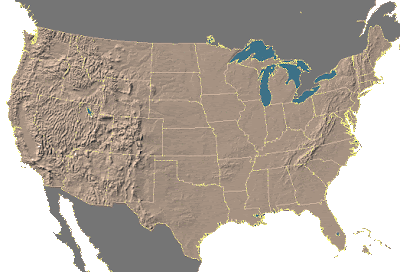Welcome to the U.S.S.A. !

Somebody please "splain" it to me.
When Hugo Chavez nationalizes oil, concrete and steel industries, it's a Bad Thing.
When George, Hank and Ben nationalize banks, its a Good Thing.
The new plan-- to currently fork over a $125 billion to nine banks and later another $125 billion to other needy banks in exchange for partial ownership-- is "not intended to take over the free market but to preserve it," according to our president. Hmm. We're supposed to shore up the Free Market by doing away with it. Capitalism will be saved by Socialism. Is this just a little postmodern irony? Or what?
Sorry, I'm just not tracking. Isn't it like saying, "we're going to preserve this marriage by practicing a bit of infidelity." Or "we're going to fix this decayed tooth by filling it with a sugar cube." It seems to me that all this is showing either that something is wrong with Free Markets, or that something is wrong with the socialist "bailout" strategy. Once and for all: is there an invisible hand, or isn't there? Paradox I can embrace, but contradictions drive me batty. Won't somebody please show me why all this isn't one immense contradiction?
Oh--what's that you say? It wasn't "nationalization," or "socialism;" it was a "capital injection."
Well there we finally have it!
Now would somebody please tell me how far $250 billion would go toward providing decent health care in this country? How do we go about getting one of those "capital injections" for the 44.8 million Americans who lack health insurance?
And then could somebody please tell me where exactly the $250 billion for the "cash injection" is coming from?
I'm no economist-- I'm only a philosopher just trying to get along.
-------------------------------------------------------
See the USA TODAY article here:
The president recognized reality again this week when he signed off on a plan to buy up to $250 billion of stock in the nation's leading banks....
The latest venture into commercial banks — "capital injection" in White House lexicon — is but another in a series of philosophical concessions Bush has made when convinced that sticking to his principles would bring on economic calamity. On Tuesday, he vowed that the government's role "will be limited and temporary. … These measures are not intended to take over the free market, but to preserve it."
The administration adopted the latest plan, however, after more than three weeks of proposing other actions, such as buying up toxic assets from financial institutions. The asset purchases are still planned, but they will take weeks to prepare.
Paulson and others initially rejected the capital injection plan, as was tried without much success in Japan in 1999.
"The right way to do this is not going around and using guarantees or injecting capital," Paulson told the Senate Committee on Banking, Housing and Urban Affairs on Sept. 23. Ultimately, the equity purchase plan became one option in the $700 billion rescue plan passed by Congress.
"I think they were opposed to the idea that someone would say it's nationalization," said Rep. Spencer Bachus, R-Ala., who said he first proposed investing in banks at a meeting with Paulson and Federal Reserve Board Chairman Ben Bernanke on Sept. 18.
By this week, Paulson had come around to the idea. "It was Hank who came and said, 'Look, we've been assessing this, and we think that given current conditions … this will work,' " White House deputy press secretary Tony Fratto said.
Bush "backed Paulson. Whatever Secretary Paulson said, that's what he was going with," Bachus said. He said Paulson called him Monday to apologize for his initial hesitancy.
Republicans and business leaders who have met with Bush in recent weeks describe a president who's not hesitant to act. His job approval ratings — 25% in the most recent USA TODAY/Gallup Poll — can't sink much lower.
Bush told business leaders at the White House earlier this month he was glad the financial crisis happened during his presidency, rather than at the beginning of a new administration, said R. Bruce Josten, the chief Washington lobbyist for the U.S. Chamber of Commerce. Bush said he told his economic advisers, "Get after it big."
No comments:
Post a Comment